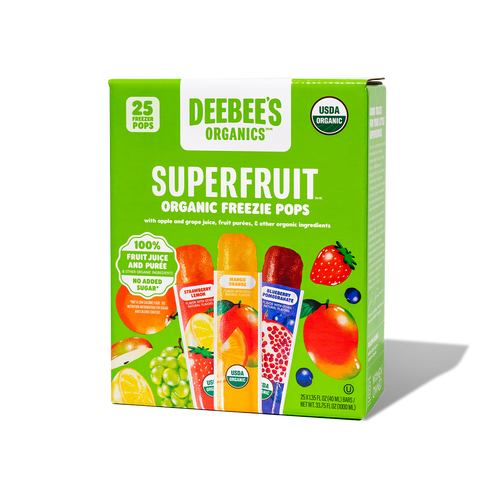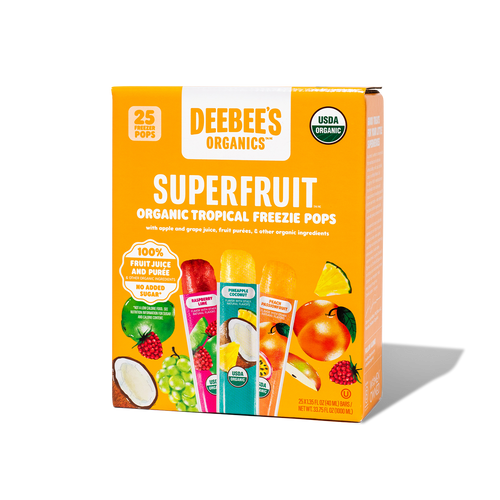You’re walking down the aisle and see two packaged products that look almost identical—one has the certified USDA Organic seal on it, and the other says “Made with Organic Ingredients” instead. Now what?
Keep reading to learn about the benefits of choosing organic produce, and what it means when packaged food products are Certified USDA Organic!
What Does it Mean When a Fruit or Vegetable is Organic?
When a fruit or vegetable is labeled as ‘organic’ in a grocery store, the produce has been grown according to specific agricultural practices. There are four key characteristics of organically labeled produce that set it apart from the non-organic variety:
- Organic fruits and vegetables are grown without the use of synthetic fertilizers, herbicides, pesticides, fungicides, or other chemicals. Instead, produce is kept healthy using natural alternatives (like compost) to accelerate growth and keep weeds and pests away. If you’re curious about the long-term effects of synthetic pesticides and fertilizers in non-organic produce, don’t forget to check out our blog on minimizing the impact of pesticide residue here!
- Organic produce contains no genetically modified organisms (GMOs) and is grown using only non-GMO seeds. If you’re wondering what sets non-GMO seeds apart from the conventional variety, the primary difference between the two is that non-GMO seeds are not modified using biotechnology or genetic engineering.
- Soil health, the environmental impact of growing, and animal welfare (if they are a part of the farming system) are also taken into consideration at organic farms. Organic farming practices emphasize soil health by practicing techniques like crop rotation, and keep environmental impact in mind by minimizing water consumption. If animals are a part of the system, they are raised according to specific standards like these set out by the US department of Agriculture.
- Finally, produce labeled as ‘certified organic’ has met a set of standards set out by the organic certification body (like USDA Organic) and must continue to meet these specifications to remain ‘certified organic’.
Now that we know what makes a fruit or vegetable organic, let’s take a look at packaged products!
What Does it Mean When a Packaged Food Product is Certified USDA Organic?
When a packaged food product has the recognizable USDA Organic seal on its packaging, it means that it is certified organic by the USDA and undergoes yearly inspection to keep its organic certification. To maintain USDA Organic certification:
- At least 95% of the product’s makeup must contain organic ingredients that are grown, harvested, and processed without GMOs, pesticides, or fertilizers.
- The organic ingredients in the product must be farmed with environmental impact, soil health, and animal welfare in mind (as applicable.)
If you’re comparing a product with the USDA Organic seal on it against one that is not, here’s some of our favorite tips to keep in mind. When something is labeled as ‘natural,’ this doesn’t necessarily mean the product is organic! Similarly, when a product is Non-GMO Project Verified but has no USDA Organic seal, it is not also organic. If a food product says that it is “made with organic ingredients” but does not also have the USDA Organic seal, this means that it does not contain enough organic ingredients (95% of the product’s composition) to achieve USDA certification. When in doubt, always look for the circular USDA Organic Seal to tell you if a product is really certified organic!
Meet Our SuperFruit Freezie Pops: The Certified USDA Organic and Non-GMO Project Verified Treat of the Summer
Did you know that our SuperFruit® Freezie Pops are both Certified USDA Organic and Non-GMO Project Verified?
That’s right—we care a lot about not only nourishing each other but the Earth too. All DeeBee’s Organics products are made from organic fruit harvested at the peak of ripeness and grown using only non-GMO seeds. Our freezer pops are also made without artificial colors, flavors, or preservatives. So what are the benefits of consuming more organic produce and food products?
The Benefits of Eating Organic More Often
We know that organic food contains nothing harmful in it. But what are the benefits? Generally speaking, consuming more organic products means that:
- We enjoy more food that is likely to contain higher levels of nutrients, vitamins, antioxidants, and minerals
- We limit our exposure to synthetic pesticides, herbicides, fertilizers, and other chemicals
- We get to eat food that often tastes fresher and more juicy since it is grown in nutrient-rich, healthy soil
- We eat less food products that contain artificial colors, flavors, and preservatives
- We support more brands and food companies that care about preventing soil erosion, supporting animal welfare, minimizing overconsumption, prioritizing the health and wellbeing of farmers, and nurturing the ecosystems of the Earth.





